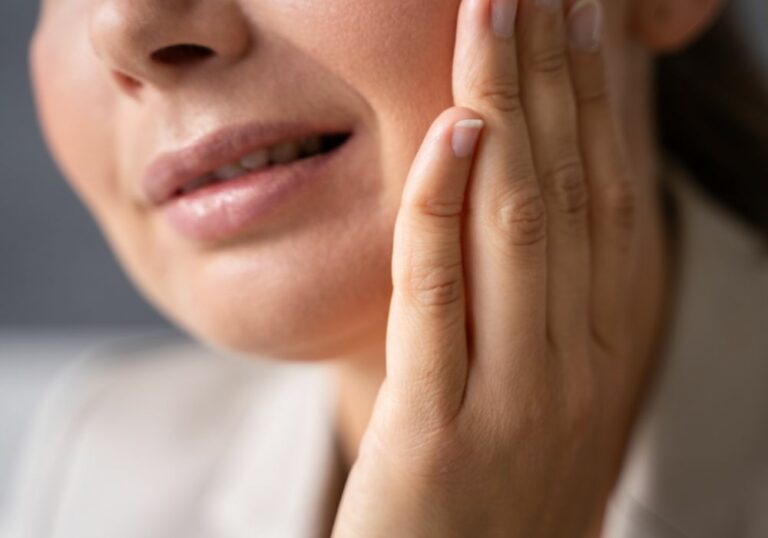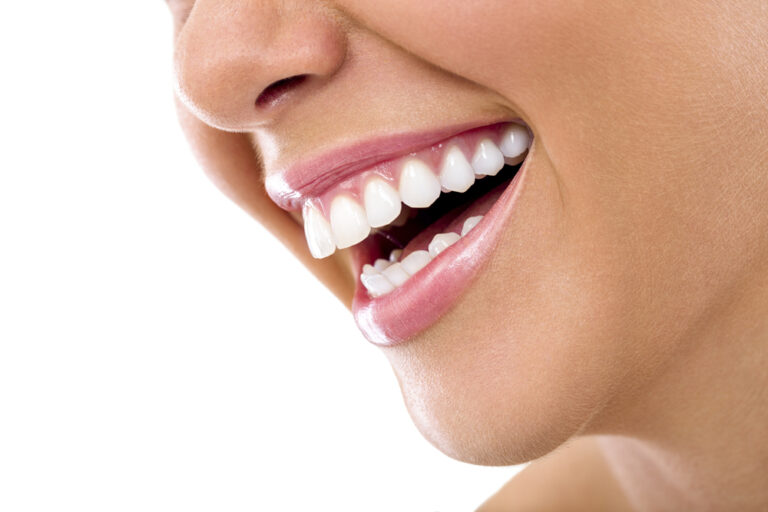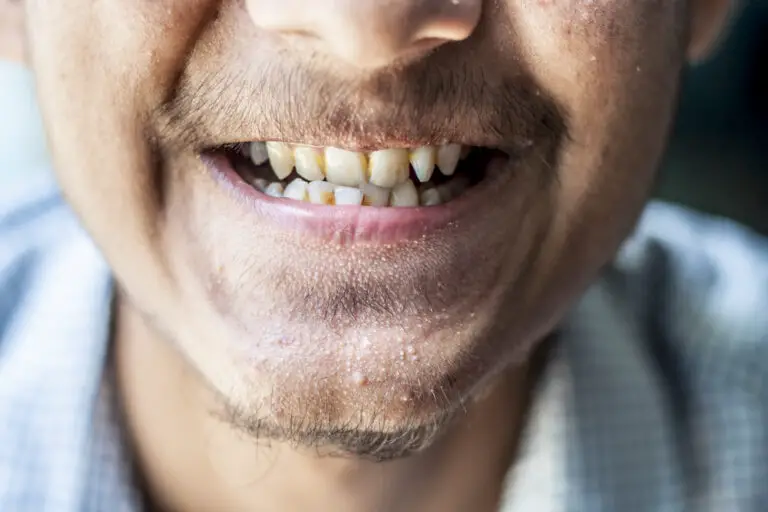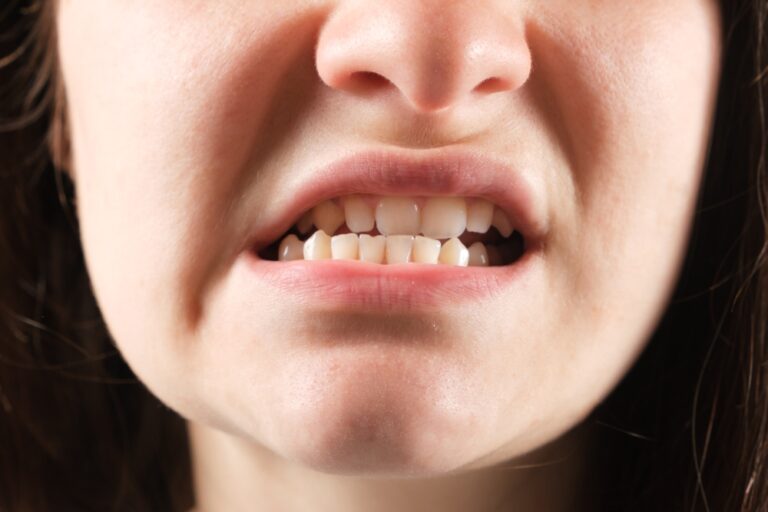It’s very common to experience some discomfort or sensitivity in your teeth after eating certain foods. You may notice anything from mild sensitivity to an outright painful, tingling, or pins-and-needles feeling. This strange sensation can be confusing and concerning. But in most cases, it’s caused by something simple and harmless.
Let’s explore some of the most common culprits behind dental discomfort after meals. Understanding the likely reasons can help you figure out when it’s nothing to worry about or time to see your dentist.
Temperature Changes
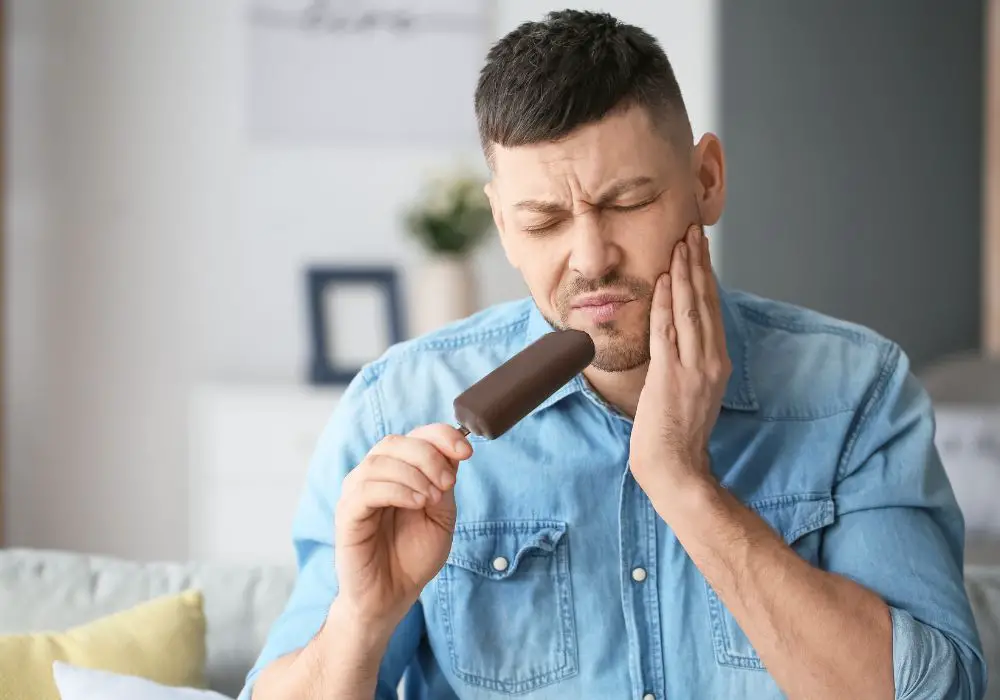
Consuming very hot or very cold foods and drinks is a prime cause of tooth sensitivity after eating.
Your mouth is normally around 98.6°F. Introducing extremely hot or cold temperatures shocks your teeth and triggers a rapid fluid shift in the microscopic tubes inside the enamel and dentin.
This sudden change affects nerve signals and movement of fluid inside your teeth. The abrupt temperature swing causes discomfort, pain, or sensitivity that normally fades once your mouth adjusts.
However, if you experience severe throbbing pain that lingers more than a few seconds after eating or drinking something cold or hot, it could signify a deeper issue.
Prolonged temperature sensitivity, especially to cold stimuli, is a symptom of enamel erosion, gum recession, or dentin exposure. Cracks and cavities allow hot or cold to penetrate deep inside the tooth’s inner layers right to the pulp.
Damaged enamel also fails to insulate against thermal changes properly. See your dentist promptly if you have sensitivity that lasts longer than a few seconds or recurs frequently.
Acidic Foods
Acidic foods and drinks can also make your teeth feel sensitive or painful during and after eating. This includes:
- Citrus fruits like oranges, grapefruit, lemons, limes
- Tomatoes and tomato sauces
- Vinegars
- Pickles
- Wine
- Sodas
- Fruit juice
- Yogurt
Food acids have a low pH that removes minerals from your enamel through a process called demineralization. Sticky or long-lasting acids are most problematic because they keep bathing teeth in dissolving acid.
Repeated acid attacks cause erosion that wears away at the enamel surface. Eventually, it becomes thin, porous, and lacks enough mineral content to maintain hardness.
At this stage, your dentin underneath gets exposed directly to food and stimuli. Dentin has much more live nerve endings compared to enamel, so it’s far more sensitive and painful.
The tingling, zinging sensation you may feel when consuming acidic foods or drinks is an early warning sign of erosion and mineral loss.
See your dentist right away if you have persistent sensitivity or pain that lasts long after eating acidic foods. Tooth sensitivity from erosion typically worsens over time without treatment.
Sugary Foods
Foods high in sugar like candy, chocolate, syrup, honey, and sugary baked goods can also make your teeth feel sensitive, even painful, when you eat them.
Bacteria inside your mouth feast on simple sugars. As a byproduct, they release acids onto your tooth enamel. This kickstarts the process of demineralization.
Sugary treats also tend to be sticky and cling to teeth surfaces. Hard candies can pull and tug on your teeth with their adhesive nature. Taffy and caramel get wedged tightly between teeth as you chew.
This constant sticky contact bathes teeth with sugar and acids for extended periods, which accelerates damage. The pulling and tugging motions also stress the enamel physically.
Eventually, the combination of prolonged acid and physical traction wears down the enamel and exposes the tender dentin beneath. Air, cold, heat, food particles, and other stimuli easily set off pain signals once dentin is exposed. That’s why sugary foods often make your teeth hurt or feel sensitive while eating.
Pay attention if any teeth seem hypersensitive or painful long after eating sugars. Seek dental help to assess erosion, decay, or cracks in your enamel soon.
Hard, Crunchy, or Sticky Foods
It’s not just sugary treats that are problematic. Hard, crunchy, and sticky foods like nuts, seeds, granola, crackers, hard candies, caramel, and even soft foods like bread can irritate sensitive teeth too.
They can lodge debris in your gum line that gets stuck between teeth or underneath the gum margins.
Crunchy foods also require lots of chewing force. This intense, prolonged pressure applied to your teeth can actually cause tiny cracks in enamel.
Hard particles like seeds and nuts can physically wear down, abrade, or fracture the enamel surface. This damage leaves tiny defects in the enamel that expose the more sensitive dentin.
Even soft bread crumbs can become impacted in these microscopic cracks and fissures. They irritate the exposed nerve endings and cause pain.
All these factors make damaged teeth even more vulnerable to temperature changes and chewing forces.
See your dentist promptly if you notice any teeth feel cracked, are sensitive to temperature extremes, or cause discomfort when eating hard, sticky, or crunchy foods. Fractured teeth require immediate treatment.
Dental Work and Restorations
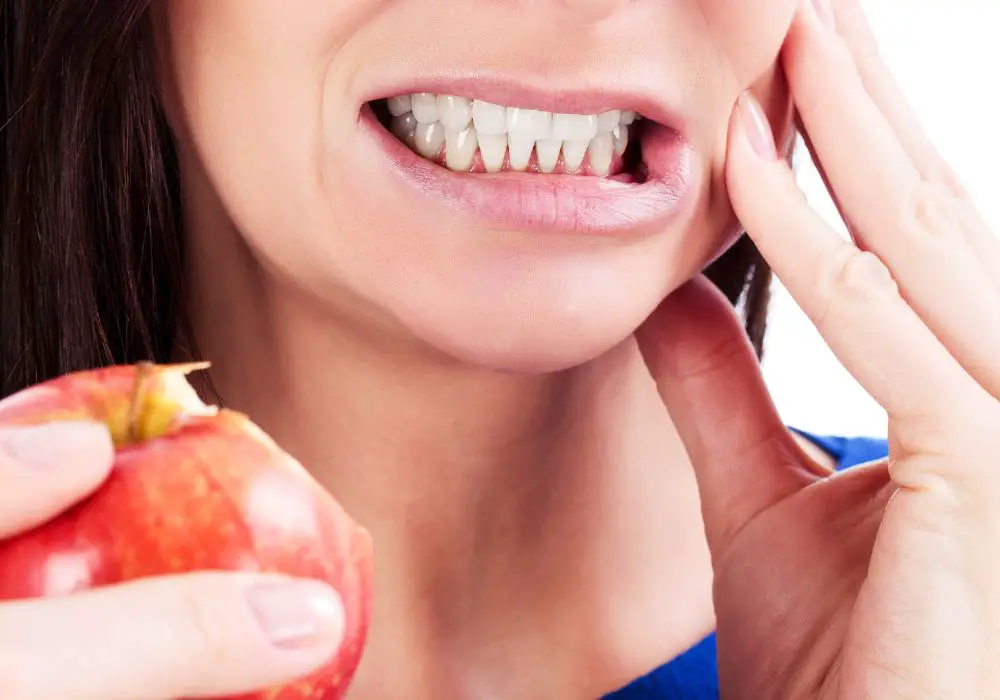
It’s common for teeth to feel hypersensitive or painful when eating or drinking after you’ve had certain dental treatments done:
Fillings: After getting a filling, that tooth may feel tender and painful for a few weeks as you chew and bite down. This is because fillings require removing some decayed enamel and dentin. The remaining tooth structure has less insulating enamel and is closer to inner nerves. As your tooth adjusts to the new filling and regains insulation over time, sensitivity during meals usually subsides. But lasting pain could mean an improperly contoured filling that’s hitting other teeth abnormally when you bite.
Crowns: It takes time for the area around a newly crowned tooth to heal after aggressive crown prep. Until the surrounding gum and bone recalibrate, you may feel some sensitivity when chewing. The new crown may also feel bulky or awkward at first. Stay on soft foods for a few weeks and avoid hard, chewy foods to allow your bite to adjust.
Root canal treatment: Teeth feel temporarily sensitive after root canals too. Infection and inflammation around the tooth dissipates over time, resolving sensitivity to pressure. Wait until tenderness goes away fully before chewing normally. Get a crown placed on the treated tooth for added protection.
Tooth extractions: It’s normal for the area of an extracted tooth to feel odd and tender for several weeks after. Time is needed for the empty socket to heal and gum tissue to reattach at the extraction site. Avoid very hot, cold, crunchy foods near extraction sites at first.
Orthodontics and braces: Your teeth, gums, and jaw joints need an adjustment period after getting braces on or off. As your bite realigns and settles into proper alignment, aching and sensitivity when eating are common temporary side effects. Use orthodontic wax and over-the-counter pain relief gels as needed.
Dental Problems
Beyond food causes and dental treatments, there are some underlying dental health issues that can also lead to strange tooth sensations when eating:
Abscesses: A pocket of intense infection and pus at a tooth’s root is called an abscess. The pressure, swelling, and inflammation involve many sensitive nerves. Abscesses cause severe throbbing pain when chewing or biting down. The movement and pressure aggravate the already inflamed nerves. You need emergency dental treatment for an abscessed tooth to clear out the infected material. This usually involves root canal therapy or extraction for relief.
Cracked teeth: Undetected hairline cracks let hot, cold, and bacteria seep deep inside the tooth structure. This causes severe discomfort with eating that’s often described as an electric jolt or shock. Badly cracked, fractured, or broken teeth may require crowns, extraction, or dental bonding to repair and prevent splits from worsening.
Bruxism: Grinding or clenching your teeth can fracture enamel, break off cusps, and damage teeth over time. The pain and sensitivity flare up while chewing and eating. Night guards during sleep protect your teeth from destructive wear due to unconscious grinding. Managing stress, getting Botox injections, and physiotherapy help reduce waking bruxism linked to tension and anxiety.
TMJ disorders: Jaw joint problems like arthritis, disc dislocation, inflammation, and dysfunction of the temporomandibular joint often radiate pain into teeth with chewing. Treating the root TMJ issue helps resolve associated tooth discomfort and sensitivity when eating.
Receding gums: Gums recede with age, periodontal disease, overly zealous brushing, and smoking. This exposes sensitive tooth roots normally protected by gum tissue. The newly exposed roots have no enamel covering and are hypersensitive to temperature extremes and touch. Gentle brushing, quitting smoking, and gum grafting surgery can help cover vulnerable roots.
Tooth grinding: Aggressive grinding quickly wears down the chewing surfaces and erodes enamel. This makes teeth more prone to temperature sensitivity and damage from eating crunchy or hard foods. Night guards and occlusal adjustment by a dentist can help minimize harmful wear.
Cavities: Unfilled cavities allow heat, cold, and food debris to penetrate deep inside the tooth where nerves are housed. This typically causes severe pain directly to the affected tooth when eating or drinking. Get cavities filled quickly before they burrow closer to inner nerves and cause worse infections.
When to Visit the Dentist
While most post-meal tooth sensitivity is harmless in the short term, some scenarios warrant prompt dental attention:
- You have severe constant toothache that disrupts sleep, requires painkillers, or prevents normal eating
- The sensitivity and pain persist for weeks or months without relief from over-the-counter remedies
- Your teeth hurt spontaneously – not just when eating or drinking
- You notice swelling, bad taste, pus, or bleeding around the gums of the affected tooth
- You have sensitivity to hot and cold temperatures
- The pain only subsides when you stop eating
- You see visible chips, cracks, or dark spots on certain teeth
- Dental fillings are cracked, loose, or missing
- You have facial swelling or numbness, earaches, headaches
- Gum recession is exposing large areas of root surface
Schedule an emergency dental visit if you have any of these more severe symptoms. Leaving underlying issues unchecked allows further damage that becomes harder to fix. Early intervention is key to minimize tooth loss and expensive repairs down the line.
Preventing Weird Tooth Sensations During Meals
You can take proactive steps to ward off sensitivity or pain after eating:
- Brush and floss very gently after meals: Clear away debris but avoid vigorous scrubbing right after eating when enamel is softest.
- Rinse with water or fluoride mouthwash: This neutralizes and flushes away acid without abrasion.
- Wait 30-60 minutes before brushing after consuming acidic foods and drinks: Allows enamel time to reharden.
- Sip cold water slowly or use a straw: Reduces thermal shock to teeth from gulping ice water.
- Limit frequency of acidic snacks and cut down on sugary foods: Minimizes acid and sugar attacks that deplete enamel and cause decay.
- Drink plenty of water: Helps neutralize acids and keeps your mouth resilient.
- Chew sugarless gum: Boosts saliva flow to remineralize enamel.
- Avoid tobacco: Smoking introduces heat, acid, and chemicals that irritate teeth and gums.
- Get routine dental cleanings and checkups: Detect problems early before they become advanced and painful.
- Use toothpaste formulated for sensitive teeth: Contains compounds to block nerve signaling.
- Talk to your dentist about occlusal adjustment: Smooths out abnormalities or interferences in your bite that put intense pressure on certain teeth.
- Ask about prescription desensitizing agents or professional treatments: Higher concentration products reduce sensitivity more effectively long-term.
- Get fitted for a night guard if you clench and grind: Protects your teeth from destructive wear during sleep.
Caring for Sensitive Teeth
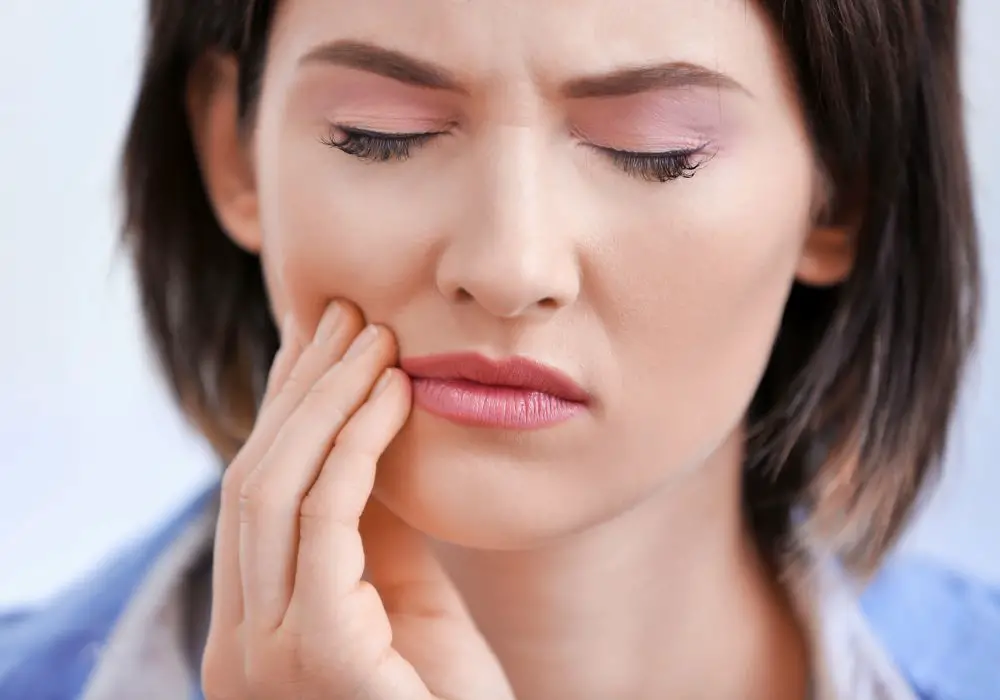
If your teeth are easily irritated after eating certain foods, be diligent about at-home care and professional treatment:
- Brush twice daily with desensitizing or enamel-strengthening toothpaste.
- Floss once daily to clear trapped particles – but avoid snapping floss against sensitive areas.
- Rinse daily with alcohol-free fluoride mouthwash to remineralize enamel.
- Drink fluoridated water and limit acidic drinks like juice, soda, wine, and coffee.
- Limit sugary snacks that fuel decay-causing mouth bacteria.
- Chew xylitol gum – this sugar substitute also reduces cavity-causing bacteria.
- Use a soft bristle toothbrush and gentle brushing motion. No aggressive scrubbing.
- Don’t brush right after eating – wait 30 minutes for softened enamel to reharden.
- See your dentist every 6 months for exams and cleanings to detect problems early.
- Get cavities filled ASAP before they grow larger and require root canals.
- Use toothpastes, rinses, gels designed to treat sensitivity. Higher fluoride concentrations strengthen enamel.
- Avoid whitening toothpastes with abrasives if you have enamel defects.
- Get cracked teeth and broken fillings repaired promptly. Prevents worse tooth fractures and infections.
- Consider sealants and dental bonding to insulate exposed roots and fill enamel cracks.
- Wear a custom night guard to protect your teeth if you grind them.
- Ask your dentist about prescription-strength desensitizing agents (high-dose topical gels, professionally applied varnishes). These work better than over-the-counter versions.
Staying on top of your oral health helps remedy and prevent tooth sensitivity problems before they worsen. But see your dentist right away if you have persistent discomfort, sensitivity or pain after meals that can’t be managed with at-home care alone. Identifying and fixing the underlying issue is crucial for getting lasting relief.
Conclusion
Experiencing tooth sensitivity or pain while eating can be worrying but is rarely serious. In most cases, it’s due to harmless factors like temperature changes, acidic foods, or candy triggering nerve irritation. Prompt dental treatment is advisable though if you have persistent, severe, or recurring discomfort after meals. This helps detect and resolve problems like dental abscesses, cracks, TMJ issues, and gum disease before they worsen or cause tooth loss. With the right preventive habits and early intervention for problems, you can keep your teeth comfortable and pain-free after eating.

